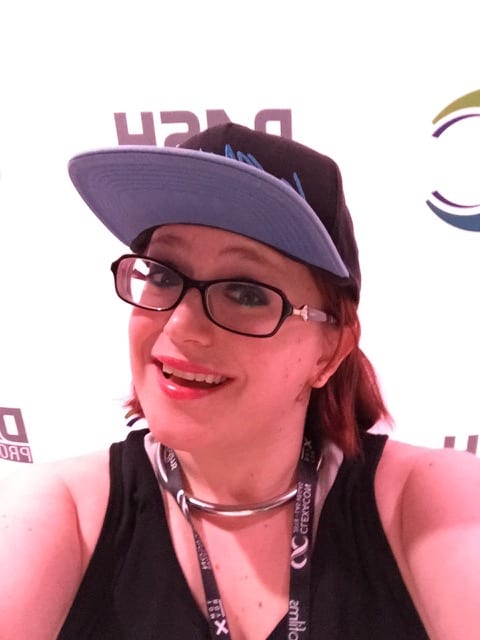
As you may know from my other Creator Corner interviews, I love to talk with authors and other creators of queer content about their work. As an aspiring author of queer scifi myself, I especially love to talk with writers of queer genre fiction. When Griffin introduced me via Tumblr to author of queer original and fanfiction Rae D. Magdon, I was over the moon. When I found out we would both be at ClexaCon, I made sure to grab her for an interview.
Rae D. Magdon is an author of queer lesbian fiction. Her stories celebrate lesbian, bisexual, queer, and trans women falling in love, and she cares deeply about including characters of color in her work. In addition to publishing novels about all kinds of women and their adventures, she has an extensive fanfiction collection available for free online.
Her latest release, Lucky 7 is a queer cyberpunk thrill ride of a book (see Griffin’s review). You can be sure we talked about that, as well as her writing process, how she got started, and lot of other things related to being queer and telling stories.
Gretchen: What got you into writing in the first place? Did you start writing original fiction or did you start with fanfic?
Rae: I started writing when I was just a kid and, in a way I wrote both original fiction and fanfiction. The first project I remember completing—I don’t know if you remember the series Redwall, but I wrote a fanfiction of it called “Ferret Den.” It was about these ferrets that lived together and they were being attacked by cobras. I was about 8, but it was a novel, it had chapters. And I finished it! It was terrible, but it was wonderful at the same time.
From there I wrote a ton of original and fanfiction side by side; they were never that distinct for me. I don’t think there’s as much difference as people believe.
The first real, serious novel I wrote—not 8-year-old Rae, but 16 to 20-year-old Rae—was called The Second Sister. It’s a retelling of Cinderella where she falls in love with her stepsister and they have to stop the other evil stepsister from taking over the kingdom. I love Disney, I love Disney princesses, and I wanted to see more empowerment in that genre, so I did retellings of fairy tales from a lesbian perspective and branched out from there.
G: I love it! Queering fairy tales is one of my favorite things.
R: There are good tropes and there are bad tropes. That is a good trope!
G: Yes! Make all the fairy tales gay.
R: I 100% agree.
G: Fairy tales, mythology, folk tales—all those stories that we know and love, let’s subvert them and make them gay.
R: What I love about the Amendyr series is that I take aspects of the original fairy tales, the darker aspects like how the sisters’ eyes get pecked out by birds. The evil stepsister does in my version, too. In The Witch’s Daughter, which is my version of Rapunzel, in the original Greek version when Rapunzel flees, she actually throws things behind her while she’s being chased by the witch. She throws a mirror and it becomes a pond, she throws a comb and it becomes a forest; there’s a similar thing in Russian fairy tales with Baba Yaga. So, I included some of those elements while still maintaining the Disney vibe, and I think it was really interesting.
G: Sounds awesome! On the topic of original fiction and fanfic, a lot of people have opinions about each of them; what do you see as the most significant differences in writing each of them? Benefits? Or do you see any distinction between the two.
R: Well, I get paid for one and not the other.
In terms of the creative process, there’s not that much difference. The only one I can think of is that if you’re writing fanfic, you have to make a close study of the source material and distill character traits that are important so that they can carry over. Also studying how they talk and the right body language so your portrayal feels real.
And actually, I think writing fanfic helps develop good skills for writing original fiction because you have to do the same thing with original fiction in terms of going down to core character traits, keeping the dialogue patterns and body language consistent, characters goals and motivations consistent. It’s really great practice for that. For one, you’re looking at an example and noting the character traits, etc. For the other, you just start in the middle of step two, which is writing them down instead of taking them from something else.
G: With so many people watching movies and TV shows, do you think reading books still has a strong place in queer storytelling?
R: Absolutely! Absolutely books are still important in terms of telling queer stories. One of the reasons is that they’re very inexpensive to make. As queer folks, we’re in a marginalized community and we often don’t get the financing to, say, create a big budget movie. Plus, to do that you need a large team and more often than not, the people on that team are going to be the people in power, which means cis, straight, white men. They’re often not going to see the value of our stories.
But if you’re writing a novel, your team is very small. You have the writer, the editor, the cover artist, the publisher, and the proof reader; that’s all very important and it is a group effort, but it’s a smaller group of people. You don’t need a large cast to produce a story. It’s a way that people on a budget can tell a beautiful, rich, diverse story without having to go through all the hoops that a television network would set up. So, it’s very easy to publish a novel.
If you want to go really, really indie, you can write it and publish it yourself on Amazon. It’s a great way for marginalized voices, including women of color and disabled persons as well, to write a book. If it’s good and you get the word out, people will read it and you don’t have to spend hundreds of thousands of dollars to make it.
G: Do you think there is anything specific about the written medium that, say, a tv show can’t do very well?
R: Internal monologues. Lucky 7 is my latest release, and I actually switched from third person to first person during the editing process. I rewrote the whole first half of the book to be in first person because one of the main characters, Sasha, experiences a huge revelation. Everything she thought she knew about herself is put into question; she isn’t sure who she is anymore and all of that had to be done in first person. We had to be inside her skin and feeling what she feels—her confusion and anger.
Don’t get me wrong, television can be a great way to explore character, I love television. But to get complex internal monologues, written word really is the best medium for that.
G: Do you have a favorite fic pairing, genre, or tropes you like to play with?
R: This question was on the Sapphic fanfiction panel! In terms of pairings, I love Clexa, Korrasami, Wayhaught, and Shiara. There are some other ones I like, too, but those are my main four.
In terms of tropes, I like end of the world sex—the suicide mission where they fall into bed because it’s their last chance to express their feelings. I also like the trope where they fall into bed together way too early and then it’s an utter disaster. It’s the opposite of a slow burn. Instead of enemies to lovers, they have sex way too soon and then they have to deal with the messy fallout afterward. Not a lot of people do it in comparison to slow burn, but it’s a great way to create drama and conflict, which is what drives stories. Tension also drives stories but conflict is a great engine for a narrative.
G: Writing a lot of fanfic seems like a lot of work if you’re also writing original fiction, how do you keep up your energy/inspiration doing both at the same time?
R: It’s actually really hard; my therapist has limited me to five projects as opposed to like, 12-20, so my list is pared down as of the last month. What really matters is not focusing on the overall goal of finishing whatever the project is, but on the system required to achieve that goal. So you set your goal, which is that you want to write a novel, and then you sit down with the system, which is I’m going to write 1000 words a day. And that can include 500 words on one project and 500 words on another. Even if you’re not feeling inspired, you can still write. It doesn’t even have to be good, you can always go back and edit it. If you focus on the system, you are highly productive and can get more projects done.
G: Speaking of original fiction, tell me a bit about Lucky 7, what inspired you to write this story? What was it about the story itself or the genre that really drew you?
R: Lucky 7 is my latest release and I’m absolutely in love with it. I’ve never been prouder of a piece of fiction that I’ve produced. I love the characters. Sasha is a black, gender non-conforming lesbian and the leader of a crew of queer misfits. It’s kind of an Ocean’s 11 vibe, but instead of robbing a casino, they’re trying to take down an evil corporation. It’s got a Blade Runner feel, too, because if I had to put a genre on the book, it’s cyberpunk. There is a thread of found family and queer hopefulness that you don’t typically get in cyberpunk, but I think it’s a refreshing change of the tropes generally go with the cyberpunk genre.
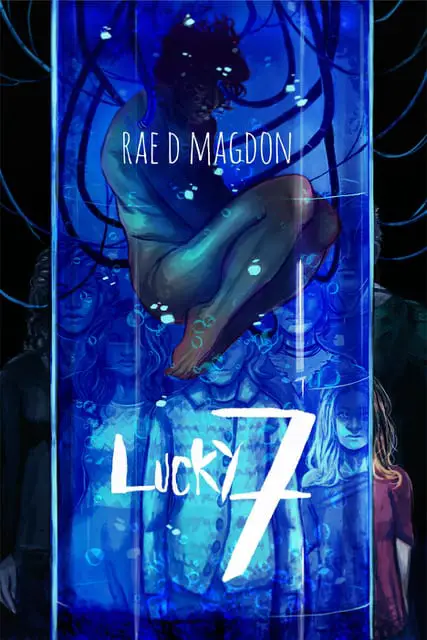
The reason I started writing it is because I read an article on waitbutwhy.com about artificial intelligence and how it was developing. If some people were afraid of it, if some thought it would save the world and, spoiler alert, there’s an artificial intelligence in Lucky 7. There’s a character named Val, V41, and she’s a member of the team. She deals with her developing humanity, and Sasha also realizes she’s not who she thought she was, that her past is not necessarily accurate as she remembers it. So she’s also dealing with questions of individuality and humanity. The theme of what makes us humans and individuals—what makes us human? Is it nature, nurture, genetics? Is it the sum of our experiences and memories? What happens if those memories get scrambled? That was a fascinating theme to me.
The other theme that was fascinating to me is found family. It’s a very queer novel because of that theme since we all have our own queer found families. The other them is ‘it’s not over yet,’ this is a dystopian, cyberpunk universe where capitalism has taken over the world. But, there is still goodness, there’s still hope. There are ways to make a dark and gritty novel still have enough hope without crushing the reader’s spirit. That’s an important distinction and a line that I like to draw between grittiness for grittiness’ sake, and grittiness that contributes to the narrative without quashing all hope or the fundamental belief that humans can be good.
G: Right, there’s a difference between something that is dark and something that is nihilistic.
R: Yes! Nihilism is a huge theme in cyberpunk, so I kind of got rid of the nihilism of cyberpunk and wrote this novel that I love.
G: Hopeful cyberpunk!
R: Yes, hopeful cyberpunk! I hope other people love it as much as I do. I’m really pleased with the reception it’s gotten.
G: I adore it. I love genre fiction so much.
R: Yes, me too! Speculative fiction is what I do. I’ve written a political thriller and a murder mystery as well. I love those too, especially the Agatha Christie type murder mysteries, but fantasy and scifi, those are my jams.
G: Same. And I feel like there’s not enough queer scifi right now.
R: No, there’s not, especially for lesfic because I think women are generally discouraged from pursuing science fiction in their stories because of the history of it.
G: Which is bullshit because the founder of science fiction was a queer woman.
R: Right! Mary Shelley. In a similar vein, you have women like Ursula K. Le Guin and Anne McCaffrey who carried on that tradition and became movers and shakers in the genre. And yet, people still seem to think it’s for boys, which is bullshit. So, write science fiction!
Scifi is important because it allows us to envision our own futures. When you are queer, it is very difficult to envision your own future, both on a personal level and a worldwide level, because we are not represented on television, in other media, or even in our own lives. I didn’t know other queer people growing up, at least not out queer people. Science fiction shows us a possible future, which is why it’s important to make it hopeful, at least a tiny bit. We’re literally writing ourselves into the future. How can we expect to be part of the future if we can’t envision ourselves there?
That’s what science fiction does. It helps us to see ourselves in the future, as part of the future, as changing the future. Queer people need to be able to change the future.
G: Yes! One of the powers of science fiction to me is that, because it’s so future oriented, we can not have a homophobic society. We can imagine and write ourselves into a future where we are not oppressed. Where we are able to exist and have adventures and do badass shit—and probably suffer along the way, but also be badass.
R: We get to be heroes. We get to see people like ourselves be the heroes; my author bio actually says ‘writing queer fiction with women as heroes’ or something like that. The other thing about it is that if you write a society without homophobia, it can be a really powerful form of escapism.
There are still ways to feel authentically queer without homophobia being the driving force of someone expressing their queerness. That’s actually what I tell straight authors who want to write queer characters: just write a character and make them be gay. Don’t write a “gay character.” Don’t even think about it really, just think about their other motivations and round them out in other ways and the gayness is just…is the word tangenital?
G: HA! Oh my god.
R: Tangential! Tangential! Why did I say tangenital?
G: I don’t know, but I love it!
R: I promise I have a good vocabulary!
G: Don’t worry about it; it’s great. So, given your personal experiences as a queer woman, talk to me about the importance of representation of marginalized communities. How did that shape the stories you tell?
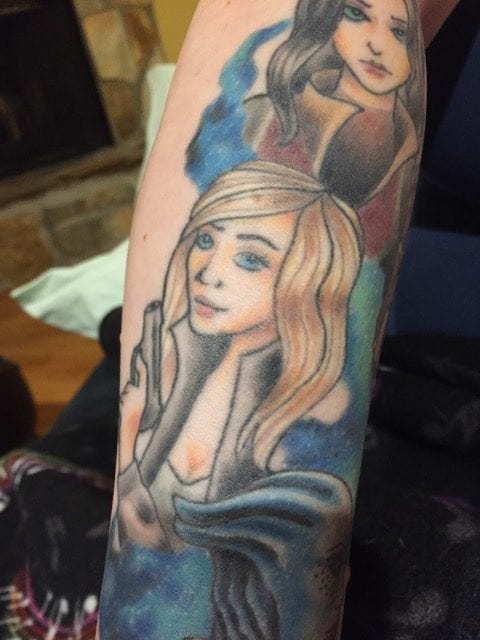
R: It shapes everything. It’s my purpose, I feel like, to empower Sapphic women through fiction because, like I said, I want us to envision ourselves as heroes. I have tattoos on my arms of Asami Sato, Korra, (female) Commander Shepard, Liara, and of course Clarke and Lexa. Whenever I’m feeling depressed or anxious or like I can’t do something, I can look at the powerful women on my arm and think, “Commander Shepard faced down the Reapers, I can do whatever I need to do.” It gets me out of bed in the morning, and I want to give that to other people, especially queer women.
I read a lot of lesbian fiction online for free when I was a teenager coming out—and my coming out was not great. Those were the only positive depictions of lesbians that I had, and I clung to them. They were my guiding force, and if I can provide that for somebody else while doing something that I love, then that’s my purpose.
G: Telling the stories that you wanted but didn’t get to see, or got to see but not enough of.
R: Not even wanted but needed. They are sustenance for the soul.
G: What do you want to see more of when it comes to the representation of queer characters and stories?
R: It would be nice to get some polyamory, especially polyamory that’s not motivated by jealousy. This isn’t queer in its depiction but Doc, Wynonna, and Dolls from Wynonna Earp has a queer vibe to it. I would really love if Doc and Dolls were just both in love with Wynonna and they were cool with each other and she was in love with both of them, because honestly that’s how it feels like its being written now.
I would love more healthy exploration of BDSM. There are so many misconceptions about BDSM, and it’s bad. Oh, and consent, it would be nice if consent was emphasized a lot.
Obviously there are things I’d like to get rid of. I’d like to see more lesbian and bisexual characters surviving until the end of the story. Less of explicitly stated lesbian characters sleeping with men on screen. Don’t get me wrong, I don’t put up with gold star bullshit. If you slept with men because of compulsory heterosexuality or because you were figuring yourself out and later discovered you were a lesbian, you’re a lesbian. But, in terms of putting that on television as “she thought she was a lesbian but then this man came into her life, the sexy white cis man,” that’s a problem.
Television is different from real life. Sometimes bisexual women have very skewed attractions. I am, like, 99.99% attracted to women and I have a trans male partner who I’ve been with for years and I stayed in my marriage. People can identify and re-identify however they want. But, on screen, if you have an explicitly stated lesbian character sleep with a man, it’s a dangerous trope. It spreads false information that can be directly harmful to lesbians by making men think that they have a chance with lesbians, which means a higher likelihood that they’ll get in your space or not take no for an answer. It’s bad.
I would also love to see more explicitly bisexual characters on tv. I hear people complain about how to write bisexual characters; they’ll say things like, “how do you do that because eventually they’re going to end up with somebody and then people won’t be happy.” To that I say, have more than one bisexual character. Write a lesbian or Sapphic couple where one of them is bisexual…and then write another bi character who ends up with a man and then nobody is disappointed. You don’t need to have just one. You can have as many queers as you want!
G: There’s no maximum limit for queer characters.
R: Right? If you’re worried that someone will be mad at you for writing a bisexual female character who ends up with a woman or with a man, just write two, write three, write five, write ten!
G: Just make everyone who isn’t explicitly gay or lesbian bi/pan.
R: Yes! It’s such a simple solution and it makes everyone happier. So, there is an answer to that question, and it’s both. Just add more.
G: And/or OT3, which is another wonderful way to ‘resolve’ that.
R: Polyamory is also a great option, and I think there are ways to write it without being gross about it. If at first it seems kind of cringe-y, that’s probably because you’ve only ever seen it executed poorly.
G: Are there any pieces of media out there that you think are doing it well?
R: Absolutely. Wynonna Earp is doing a great job, Brooklyn 99 is slaying. The Good Place is killing it. I wish it would get a little more gay, but given that’s not the focus of the show, I still like it. It’s not heterosexist, it doesn’t assume that the characters are straight, and I like that.
This is a relic, but I actually like Angela from Bones. It’s not perfect, I wish she were a bit more expressive in her bisexuality. But, what I love about Angela is that you always know she’s going to end up with Hodgins, and I’m a Sapphic woman who can’t relate to heterosexual relationship at all in my media, but even I liked Angela and Hodgins.
When Angela’s girlfriend Roxie was introduced in season 4, it didn’t feel as though the lesbians were being taken for a ride. It didn’t feel like queerbaiting like Once Upon a Time or Rizzoli and Isles or SuperCorp, any of that bullshit. It was genuine, it felt natural. But you knew she was going to end up with Hodgins and they did not kill their lesbian. Roxie just knew she wanted to get really serious and also knew that Angela didn’t want to get as serious as fast and so they split up amicably, being lovely to each other.
So you can do it, you just have to do it well. What else is doing it well? Obviously Legend of Korra but that’s over. There are lots of lesfic publishers that are doing it well. Buy lesbian books! I won’t give a bunch of titles because there are so, so many, but I will name publishers. Go to their websites and look through their offerings and whatever tickles your fancy, take a look at it.
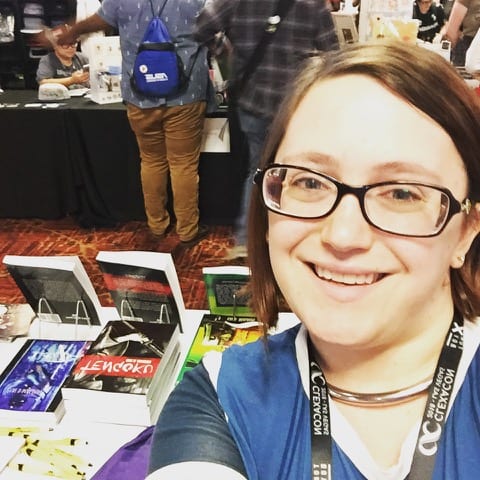
My publisher is Desert Palm Press, and I’m not their only author. You should read all my books, of course, but you should also read the other authors from Desert Palm Press, like AJ Adaire, she does a really great job. Bywater books, Bella Books, Boldstrokes Books—lots of B’s. BLF Press is an interesting one, they actually focus on black lesbians. All their writers are black Sapphic women, all their editors, everybody. I bought one of their books recently, Two Moons, it’s an anthology, so shout out to a small, independent, black lesbian publisher. There’s Sapphire Books, of course, which is at ClexaCon with us, so there are lots of different publishers who are doing wonderful things with lesfic.
When you read lesfic, you are guaranteed to have a wonderful lesbian, sometimes bisexual, protagonist who is not there for the development of a straight character. And, usually the books end happy for now; they’re not going to get killed off. You usually get something akin to a happily ever after.
G: Which is great, because we don’t get enough of those.
R: Yes, so read lesfic; it’s a lot like fanfic. It carries over all the tropes of fanfiction like ‘enemies to lovers,’ ‘sharing a bed’—all the great tropes of fanfiction migrated to lesfic with Xena: Warrior Princess because that’s where it started. We talk a lot about it in my Sapphic fanfiction panel at ClexaCon, so watch that. It’s available on YouTube (Part 1, Part 2).
G: If you could give one piece of advice to other aspiring writers who want to write original fiction and/or fanfiction that you don’t think others are saying, what would it be?
R: Actually, I already gave it: focus on the system, not the goal. If you want to write a novel, you can’t wait for inspiration, you can’t be too much of a big picture dreamer. You just have to sit down and write 500 words. They don’t even have to be good, because you can always edit later. But, if you have a daily schedule, like writing 500 words a day, it’s easier. Don’t think about finishing the novel as the goal, just finishing that 500 words. You have to break it down into manageable segments to create a lot of content, and you have to write even if you don’t feel like writing. That’s the biggest piece of advice I could give: write even if you don’t feel like it.
G: Don’t wait to want to.
R: Don’t wait to want to, because then you never will.
G: What’s coming up next for you? Any other projects you’re working on that you can tell us or hint to us about?
R: Hint about, well, I would love to see Lucky 7 go into other mediums besides a novel, so let me put that out there. There will be a sequel to Lucky 7 in novel form, Lucky 8, and it deals with some of Sasha’s conflict that’s set up in the middle of Lucky 7.
I’m also going to tease four words of a potential project: urban fantasy film noir.
G: Ooooh, I like the sound of those four words!
R: Yes! And also, we’ll be releasing Fur and Fangs #9 and #10, and then a few months later we’re going to do a volume of all the ten stories. And I can say there will be a volume two. I’m not done with Isabeau and Riley. Riley is so important for non-binary representation. I’ve gotten so many messages; I think Riley is the most beloved character I’ve ever written, which is very touching. Although, I think Sasha is quickly gaining ground there. Personally, I love Elena and Isabeau, I put more of myself into them; they’re my favorites for sure. Eventually the first few stories of Fur and Fangs will be free, because I want to make them accessible to queer kids who may not necessarily have the funds.
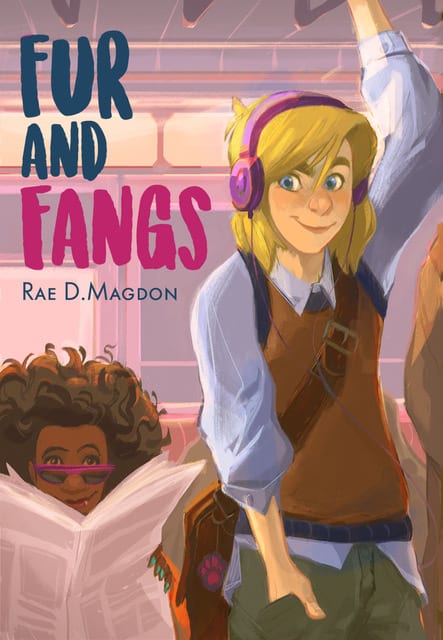
There’s one last thing I should say, if you have the money—if you’re closeted and poor, don’t feel guilty, I’ve been there, I was pawning my grandmother’s jewelry to pay rent when I was younger. But, if you are older, you should be supporting the content that you love. You should be supporting independent queer creators because we are writing stories for people who can’t access them easily. It’s super important. That’s one of the reasons I love my fans. They’re really generous and they donate to my Patreon, which allows me to write full time. Otherwise, I’d be teaching private music lessons still and writing about half of what I do now.
G: Anything else you want to share with us before we go?
R: I love ClexaCon! It’s been a great time and shoutout to everyone who met me at ClexaCon.
G: Thank you so much for doing this!
R: You’re welcome!
—
If you want to check out Rae’s most recent book, Lucky 7, head on over to Amazon. Also make sure you check out her website, Tumblr, and Twitter to stay updated on all her current (and past!) projects as well as other fun things. If you want to support her writing, check out her Patreon.
[Editor’s Note: The spelling of Amendyr has been amended from the original, and incorrect, Amandyr.

